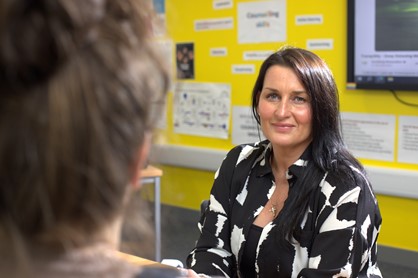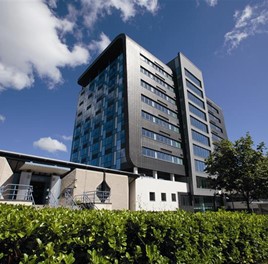
Behavioural Science - Level 3
Start Date: 1st September 2026

- Length 2 years
- Study Full-Time
- Location Rye Hill Campus
Qualification Gained
Level 3 WJEC Extended Certificate in Criminology, Level 3 BTEC Extended Certificate in Psychology, Level 3 NCFE Certificate in Understanding Mental Health, OCR EPQ (Extended Professional Qualification)
Levels ExplainedMore about the course
Do you ever wonder what drives people to commit crime, why we think and feel the way we do, or how mental health shapes our lives? Are you fascinated by the mysteries of the human mind and behaviour? Our Behavioural Science course has been designed for curious minds who want to explore psychology, criminology and mental health in depth.
You will study psychology, where you will explore how the brain works, how we learn, and why we behave the way we do. Studying criminology will give you the chance to investigate crime and justice and examine the impact criminal behaviour has on society. You will develop an understanding of mental health, gaining essential knowledge of conditions, strategies for support, and the importance of wellbeing.
You will also complete an Extended Project Qualification, carrying out independent research on a topic of your choice and developing valuable skills for university and beyond.
Throughout the course you will benefit from workshops, guest speakers and enrichment activities that bring your learning to life, equipping you with the knowledge, skills and confidence to progress onto degrees in psychology, criminology, social work and other related fields.
Get In Touch
Meet our staff and students

George Vincent
Level 3 Applied ScienceA lot of my tutors are from industry, which gives me a lot of insights into what the science industry is like and what kinds of jobs I can do afterwards. I’d love to study microbiology or genetic research for my career, it’s absolutely an interesting field to work in!
Science at Newcastle College

What can I do with a qualification in Science?
Daily tasks:
- Monitors the distribution, presence and behaviour of plants, animals and aquatic life, and performs other scientific tasks related to conservation not performed by jobholders in MINOR GROUP 214: Conservation and Environment Professionals.
- Advises farmers, medical staff and others, on the nature of field crops, livestock and produce and on the treatment and prevention of disease.
- Observes the structure of communities of organisms in the laboratory and in their natural environment.
- Researches the effects of internal and external environmental factors on the life processes and other functions of living organisms.
- Performs tests to study physiological and pathological characteristics within cells and other organisms.
- Identifies and studies the chemical substances, including microbial infections, involved in physiological processes and the progress of disease.
- Studies the physical and chemical form, structure, composition and function of living organisms.
Powered by EMSI
Daily tasks:
- Addresses conferences and publishes articles detailing the methodology and results of research undertaken.
- Undertakes analyses of data, presents results of research to sponsors, the media and other interested organisations.
- Administers questionnaires, carries out interviews, organises focus groups and implements other social research tools.
- Identifies, compiles and analyses economic, demographic, legal, political, social and other data to address research objectives.
- Traces the evolution of word and language forms, compares grammatical structures and analyses the relationships between ancient, parent and modern languages.
- Undertakes research across the humanities that furthers understanding of human culture and creativity.
- Studies society and the manner in which people behave and impact upon the world.
Powered by EMSI
What can I do with a qualification in Science?
Science, engineering and production technicians n.e.c.
Biological Scientists and Biochemists
Daily tasks:
- Monitors the distribution, presence and behaviour of plants, animals and aquatic life, and performs other scientific tasks related to conservation not performed by jobholders in MINOR GROUP 214: Conservation and Environment Professionals.
- Advises farmers, medical staff and others, on the nature of field crops, livestock and produce and on the treatment and prevention of disease.
- Observes the structure of communities of organisms in the laboratory and in their natural environment.
- Researches the effects of internal and external environmental factors on the life processes and other functions of living organisms.
- Performs tests to study physiological and pathological characteristics within cells and other organisms.
- Identifies and studies the chemical substances, including microbial infections, involved in physiological processes and the progress of disease.
- Studies the physical and chemical form, structure, composition and function of living organisms.
Powered by EMSI
Social and Humanities Scientists
Daily tasks:
- Addresses conferences and publishes articles detailing the methodology and results of research undertaken.
- Undertakes analyses of data, presents results of research to sponsors, the media and other interested organisations.
- Administers questionnaires, carries out interviews, organises focus groups and implements other social research tools.
- Identifies, compiles and analyses economic, demographic, legal, political, social and other data to address research objectives.
- Traces the evolution of word and language forms, compares grammatical structures and analyses the relationships between ancient, parent and modern languages.
- Undertakes research across the humanities that furthers understanding of human culture and creativity.
- Studies society and the manner in which people behave and impact upon the world.
Powered by EMSI
Good to know
What's happening?
Events


SEND Friendly Open Event
Rye Hill Campus
Wednesday 1st April 2026
5:00pm - 7:00pm

Either
- The level required to start the course
- The level rewarded when completing the course
Not a Newcastle College student?
If you are not currently a Newcastle College student, apply here:
VISIT UCASNewcastle College students
If you are a current Newcastle College student, apply here:
CURRENT STUDENT APPLICATIONor Continue Browsing
Course Added
This course has now been added to your basket. Please click below to apply now or continue browsing.
Apply Now How to Make an Application
How to Make an Application
 College or Sixth Form. What's the difference?
College or Sixth Form. What's the difference?
 16 to 18 Support
16 to 18 Support
 Student Life
Student Life


